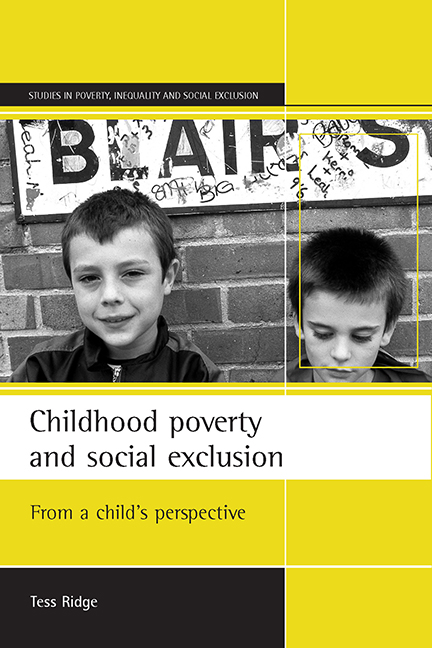Book contents
- Frontmatter
- Contents
- List of tables and figures
- Acknowledgements
- one The challenge of child poverty: developing a child-centred approach
- two What do we know about childhood poverty?
- three Children’s access to economic and material resources
- four ‘Fitting in’ and ‘joining in’: social relations and social integration
- five Family life and self-reflection
- six Experiences and perceptions of school: analysis of the BHPYS data
- seven Childhood poverty and social exclusion: incorporating children’s perspectives
- References
- Appendix BHPYS Wave 7
- Index
four - ‘Fitting in’ and ‘joining in’: social relations and social integration
Published online by Cambridge University Press: 20 January 2022
- Frontmatter
- Contents
- List of tables and figures
- Acknowledgements
- one The challenge of child poverty: developing a child-centred approach
- two What do we know about childhood poverty?
- three Children’s access to economic and material resources
- four ‘Fitting in’ and ‘joining in’: social relations and social integration
- five Family life and self-reflection
- six Experiences and perceptions of school: analysis of the BHPYS data
- seven Childhood poverty and social exclusion: incorporating children’s perspectives
- References
- Appendix BHPYS Wave 7
- Index
Summary
Chapter Three revealed the tangible impact of economic and material poverty on the lives of children from low-income families. However, to understand the multidimensional impact of poverty on children's lives, an analysis of poverty that embraces the social relational aspects of children's lives is also needed. The notion of social exclusion has the potential to broaden our understanding of poverty from a narrow issue of inadequate material resources to a more comprehensive and dynamic analysis (Berghman, 1995). The relational impact of poverty, outlined by Room (1995), as inadequate social participation, lack of social integration and lack of power has a particular resonance in children's lives. Childhood is a social experience in itself, with its own norms and customs, where the costs of inclusion may be great, likewise the cost of exclusion. Friendships and social interactions with peers are key locations where children develop their social identity and enhance their social capital. This chapter provides an opportunity to understand the social lives and experiences of children in poverty, through the medium of their own voices. It reveals the children's interpretations and constructions of their social relationships and it explores the children's perceptions of their ability to participate in the social world of their peers.
The chapter focuses on three key areas:
• The capacity of children to fit in with their peers. This is examined through an exploration of social relationships bounded by friendship and bullying.
• The importance of clothes as a key signifier of peer inclusion, this was a particular area of concern identified by children during the interviews.
• Children's opportunities to join in shared social activities with their peers. This focuses in particular on children's social experiences at school and on the children's perceptions of their capacity to join in with shared social activities.
‘Fitting in’: friendships
The importance of friendships and the value of developing and sustaining satisfactory social relationships have only recently been acknowledged as significant factors in the development of social capital and in the maintenance of secure social identities. With modern society increasingly characterised by risk and uncertainty (Beck, 1992), the value of friendships as a source of support in the face of breakdown of other traditional forms of support has only recently been explored (Pahl and Spencer, 1997; Pahl, 1998; Silva and Smart, 1999).
- Type
- Chapter
- Information
- Childhood Poverty and Social ExclusionFrom a Child's Perspective, pp. 59 - 84Publisher: Bristol University PressPrint publication year: 2002



